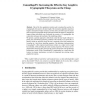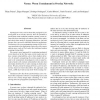1511 search results - page 26 / 303 » On the effectiveness of address-space randomization |
ACNS
2004
Springer
13 years 11 months ago
2004
Springer
One of the few quantitative metrics used to evaluate the security of a cryptographic file system is the key length of the encryption algorithm; larger key lengths correspond to hig...
DSN
2009
IEEE
14 years 2 months ago
2009
IEEE
Topological worms, such as those that propagate by following links in an overlay network, have the potential to spread faster than traditional random scanning worms because they h...
VTC
2008
IEEE
14 years 2 months ago
2008
IEEE
— Recently, we proposed a random transmit power control (TPC) to increase the uplink capacity of DS-CDMA wireless packet access using Rake combining. Furthermore, we evaluated th...
ECRTS
2009
IEEE
13 years 5 months ago
2009
IEEE
While hardware caches are generally effective at improving application performance, they greatly complicate performance prediction. Slight changes in memory layout or data access p...
ICPR
2006
IEEE
14 years 8 months ago
2006
IEEE
Coarticulation is one of the important factors that makes automatic sign language recognition a hard problem. Unlike in speech recognition, coarticulation effects in sign language...


